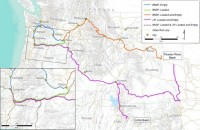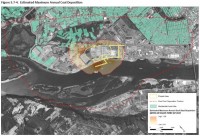For Immediate Release
Dept. of Ecology Report Confirms: Huge Impacts from Proposed Coal Export Terminal in SW Washington
Proposed Terminal Would be Largest in North America Greenhouse Gas Emissions Could be Equivalent to Five Coal Fired Power Plants, “Hours and Hours” of Traffic Delays from Coal Trains

April 29, 2016 (Longview, WA) – The Washington Department of Ecology today released their draft Environmental Impact Statement (DEIS) for Millennium Bulk Terminal’s proposed coal export terminal along the Columbia River. The report comes after the agency received over 165,000 public comments calling for a broad review of the proposed coal export terminal.
“The review's findings confirm what the public has said for over six years: This project has significant, unavoidable impacts--from greenhouse gas emissions to traffic delays,” stated Jan Hasselman, attorney for the Power Past Coal Coalition. “The Dept. of Ecology acknowledges that moving over 44 million tons of coal in uncovered trains and stockpiling it along the Columbia would harm people’s health and the river. The bad news is the review falls short, relying on unproven mitigation. Now is the public’s chance to weigh-in to say no to coal export in Washington.”
If built, the Longview terminal would export up to 44 million tons of coal each year to Asia and would be the biggest coal export terminal in North America.
The public called on the U.S. Army Corps, WA Dept. of Ecology and Cowlitz County to evaluate a broad array of impacts, including local and regional congestion issues from up to 16 coal trains per day (full and empty), health impacts from increased coal dust and diesel emissions, the cumulative impacts from the other proposed coal export terminals, and the climate and health impacts of burning coal in Asia.

“The report paints a bleak picture for people who live near the coal terminal,” said Roy Staples, Longview resident with Landowners & Citizens for a Safe Community. “It confirms what we know from coal export sites around the world. They’re dirty. Coal dust hangs in the air and coating homes. The path forward is clear: Uncovered coal trains and stockpiles have no place in Longview, along the Columbia, or on the exposed BNSF railroad adjacent to traffic on both sides of Interstate-5.”
In the report, the Dept. of Ecology does note that the greenhouse gas emissions from the proposed terminal could be the equivalent of five coal-fired power plants.
“We are already seeing industries critical to our economy being hit hard by climate impacts and we are moving off of coal-fired power in Washington, said Beth Doglio of Power Past Coal coalition. “We can do better than coal exports.”
While the report acknowledges the problem with coal dust, it does not address how to solve or mitigate the health problem, stating: “[R]esidents who live along the main line could experience nuisance levels [of coal dust] which may visible soiling on window sills, outdoor furniture, and other property.” DEIS Chap. 5 at 5.7-21.
“As a local realtor and a landowner with vineyards next to the railroad tracks these coal trains pollute the landscape, hurt property values and degrade the Columbia River Gorge National Scenic Area,” said Don McDermott of Dallesport, Washington.
“Polluted air is hurting our health and it’s going to get much worse if we don't take action,” stated Dr. Patrick O'Herron, President of Oregon Physicians for Social Responsibility. “The sooner we take steps to protect ourselves from dirty coal, the sooner every family, community, and business will benefit from cleaner air and water, better health, lower health care costs, and stronger communities. Protecting ourselves from the health effects of coal trains is the right thing to do - and the smart thing to do."
The review stops short of looking at the impacts to communities outside of Washington State’s borders, despite the fact that communities along the rail-line and close to the strip mines would see impacts.
“The Longview coal port is bad news for Montana,” said Montana rancher Steve Charter. “If it were built, we’d have to live with the effects of coal mining, and dozens of Montana rail towns would have to endure the traffic delays, diesel exhaust, and air pollution as private companies ship Montana coal to Asia.” Charter, former Chair of Northern Plains Resource Council in Billings, Montana, ranches above a longwall, underground mine in the Bull Mountains of southcentral Montana.
“The proposed coal terminal in Longview, WA would mean our community gets dirty coal train traffic – threatening our health, safety, economy, and Lake Pend Oreille – without any benefit,” said Shelby Rognstad, Mayor of Sandpoint, ID. “We cannot let multinational corporations threaten our community's livelihood just so they can profit. This impact statement makes the decision clear – this coal project should be rejected – as it already has been by communities across the Northwest.”
Of the seven proposed coal export terminals in the Northwest, two remain on the table in Washington: Millennium Bulk Terminals in Longview and Gateway Pacific Terminal at Cherry Point, outside of Bellingham. The Army Corps of Engineers is expected to announce a decision around the Lummi Tribe’s treaty rights on May 9th. A court challenge to block the development of a coal terminal at the Fraser Surrey Docks in British Columbia won a legal victory earlier in the week, when a judge dismissed objections from project proponents, allowing the lawsuit to continue.
The release starts the 45 day public comment period ending June 13th during which anyone can comment on the draft substance. There are three public hearings in Longview (May 24, 2016), Spokane (May 26, 2016), and Pasco (June 2, 2016). Public comments are being accepted online. The U.S. Army Corps of Engineers will release their draft report in July. Millennium originally submitted permits in 2010 for a much smaller terminal, but news outlets revealed they failed to disclose the scope of their plans for the project to the community in the first round of permitting and had to pull their original permits.
###
POWER PAST COAL is an ever-growing alliance of health, environmental, clean-energy, faith and community groups and businesses working to stop coal export off the West Coast. Powerpastcoal.org
Resources:
- Millennium Draft Environmental Impact Statement
- Summary of Key Findings
- Key visuals from the DEIS:
- Cowlitz County Washington State Department of Ecology Figure S-2, Expected Rail Routes for Trains Related to the Proposed Action p7
- Cowlitz County Washington State Department of Ecology Figure 5.7-4, Estimated Maximum Annual Coal Deposition p19
- Cowlitz County Washington State Department of Ecology Figure 5.7-3. Estimated Maximum Monthly Coal Deposition p18
What Can you Do?
- Submit your comment on the Draft Environmental Impact Statement today!
- Coal Exports Workshop informing you on the key points in the draft EIS and how to create effective public comments on Monday, May 9, 2016 from 6:00-8:30PM, details here.
- Attend the important public hearings:


